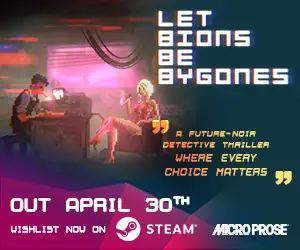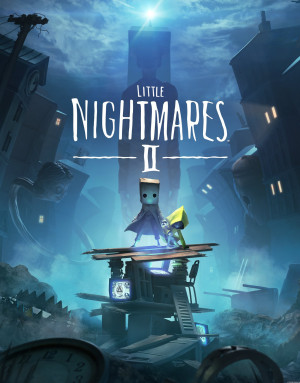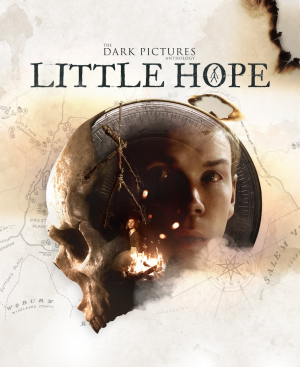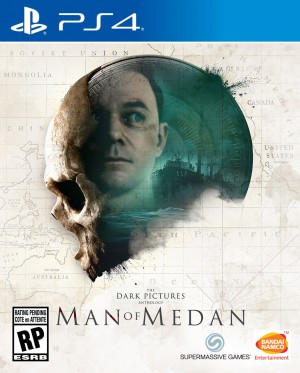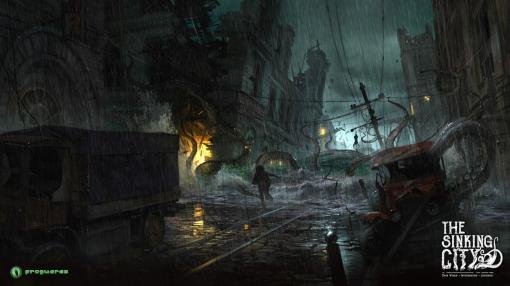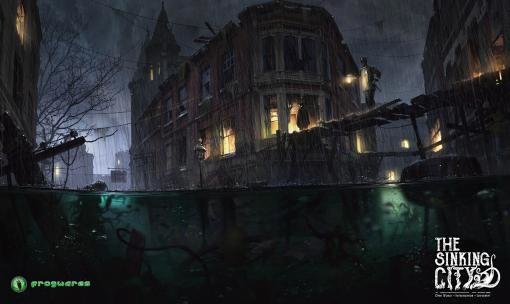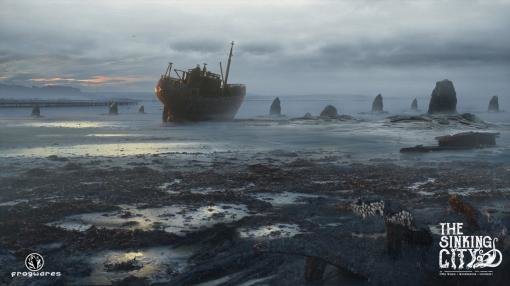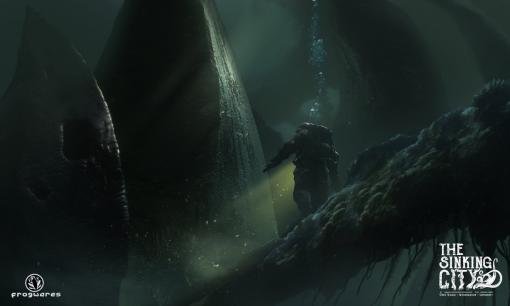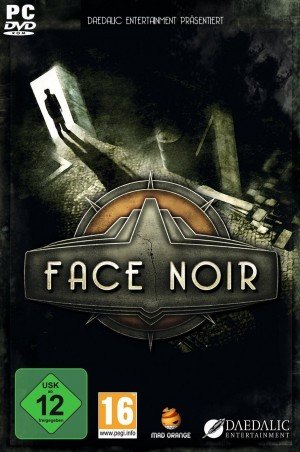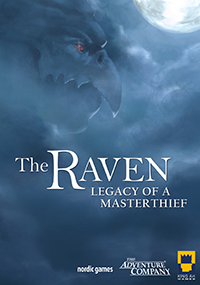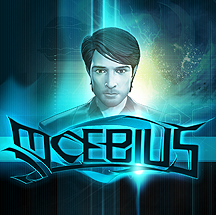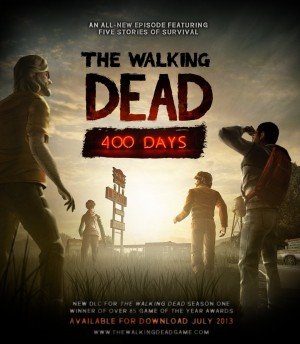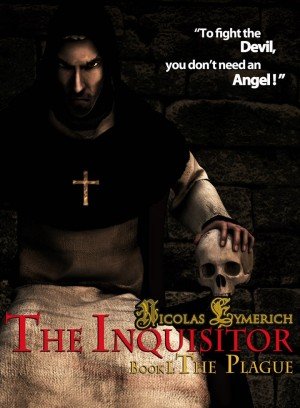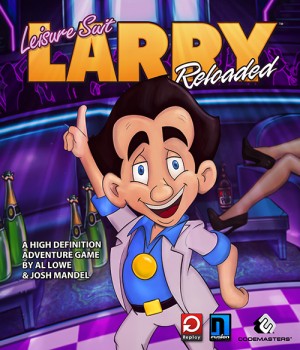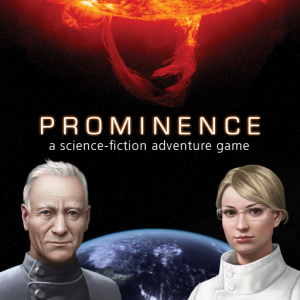The Sinking City with Frogwares’ Sergey Oganesyan preview - page 2
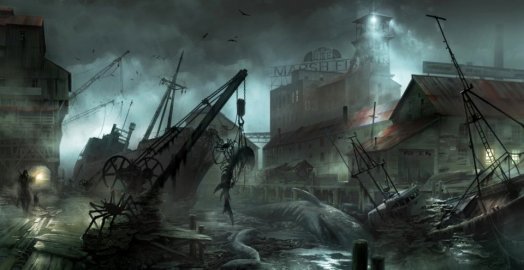
Game information
Players of this game, also enjoyed these adventure games
Hands-on at EGX Rezzed 2018
By Annie Durwood
London’s EGX Rezzed conference offers visitors the opportunity to see the latest and greatest in upcoming indie projects. One such title on display this year was The Sinking City, by Frogwares Studio, giving me the chance to check out the upcoming open world detective thriller first-hand. The game takes place in a Lovecraft-inspired version of 19th century New England, with players controlling a private detective trying to solve the various mysteries that plague this tentacle-infested world. Right away I was impressed by how spot-on the Lovecraftian themes are, and the attention to detail shows in every corner, from the inexplicably flooded streets, to the NPCs, to the props in every scene. Frogwares did not miss a thing, and it absolutely shows.
Gameplay is very interesting, as it branches out in different ways. Fans of Frogwares’ past titles (most recently Sherlock Holmes: The Devil’s Daughter) will be quite familiar with the most basic aspects here, though this is no traditional adventure by any means, feeling much more like the popular L.A. Noire in certain ways. Your job requires traversing all over the city, interrogating various suspects to discover clues for your newest case. Instead of a car though, you travel via motorboat through the city streets. Just watch out for the occasional tentacle or two.
The occasional gun fight will surprise you both in its difficulty and abrupt appearance. You literally do not see it – or rather the scarily accurate Lovecraftian creatures you must fight – coming. In fact, I know of one reviewer who dropped her controller and made a sound not all that dissimilar to Daffy Duck yelping at the onset of one such gun battle. This not being me, no way, I’m super-tough, not afraid of nothing, no sir, nuh uh. I promptly laughed and continued my demo. The challenge here involves aggressive monsters coming at you at startling speed, attempting to end you using their various claws via brute strength. You must be quick to shoot them, lest they kill you in a most horrifying and gut-squelching manner. Should you die, the game restarts at the last automatic save point, so at least the stakes aren’t as cutthroat as the plot itself.
(Click for larger version. All Sinking City images are concept designs only.)
An Xbox controller was used for the demo to navigate the protagonist in third-person. I found the controls themselves to feel quite fluid and intuitive, though jumping around a bit in actual gameplay (from shooting to driving a boat, etc.), does take some getting used to. However, this is not unlike any other game that utilises comparable mechanics. In another similar fashion to both Sherlock and L.A. Noire, you use your trusty notebook to keep track of your cases. Current objectives, suspects and places of interest are all recorded in this handy-dandy book, and it serves as your most invaluable tool. Almost as helpful is your user-friendly map, which serves as a teleportation tool that allows you to quick-travel to specific locations around the city.
The Sinking City also features decision-making as one of its more prominent elements. The characters you talk to and the locations you visit are all dependent on how thorough you choose to be. The characters I met were extremely well crafted. One woman I spoke to had her mouth sewn shut, another nod to Lovecraft. When talking to someone, you have several options in your responses and the questions you can ask. At the beginning of this particular mission, I had the option of either charging or not charging my client a fee (in this case her wedding ring). Not wanting to deprive a distraught woman of her only memento of her missing husband, I chose to not charge her. Who says you can’t be altruistic in a game?
Choices like these are what lead to other locations and characters becoming available to you. As all decisions are permanent, however, be careful what you say. In the case of my own playthrough, my intended good deed led to a very unhappy cult group getting their hands on me in the end. Though I didn’t see it for myself, Frogwares’ Sergey Oganesyan told me that these decisions also lead to a variety of different endings. With wide-ranging narrative branches even in small matters like this, playing the game the same way twice would be extremely difficult, as the number of choices you make are so frequent and varied it would be like trying to re-enact a Lovecraftian version of Groundhog Day.
The environment is simply stunning, with every little touch adding to the wonderfully bleak atmosphere. Walking the city streets reveals giant monolithic structures in the distance (a mystery you will surely uncover later on), water-clogged roads that can't be traversed on foot, and a variety of characters that all seem like they maybe need a hug and a sandwich. The scum and grime is so plentiful, it’s hard not to check your shoes for something you may have stepped in. The fish market in particular is a cacophony of rotting fish guts, hanging carcasses, and workers afflicted with some sort of barnacle-like skin condition. I suspect that dermatologists aren’t covered in their health plan.
Character animations are also very nicely done, both for the background NPCs and the people you interview. The diversity in character design allows for subtlety to shine through, adding even more to the immersive quality of the game. Overall, really the graphics are so strong that I genuinely hesitate to call this an “indie” game, just because the production value is so high. The soundtrack as well is a nice blend of classical and neo-noir, seamlessly fitting into the rest of the landscape.
There may be those disappointed to see that Frogwares has embraced a more action-oriented direction after so many beloved Sherlock Holmes mysteries, but from what I saw the diverse mechanics are handled well, and it’s plainly evident that the Ukrainian developer is relishing the chance to bring a Lovecraftian city to life. Having now sampled the game personally, I cannot wait for the release of The Sinking City, as I am itching to uncover all the mysteries that lie within it.
As a limited demo at a busy games convention can only reveal so much, we kept digging for additional insight into this upcoming Lovecraftian action-adventure. To learn more about the game, read on as Ingmar Böke chats with Sergey Oganesyan, community manager for Frogwares.
Ingmar Böke: Hi Sergey. Welcome to Adventure Gamers! For those who may not be familiar with you, please introduce yourself and your role at Frogwares.
Sergey Oganesyan: Hey, my name Sergey Oganesyan. I’m a community manager at Frogwares who has been with the company for the past six months.
Ingmar: The Sinking City is an “open world investigation game inspired by H.P. Lovecraft”. Please give us a more detailed idea of the concept.
 |
Frogwares community manager Sergey Oganesyan |
Sergey: Let’s start from the beginning. The Sinking City is a third-person, open world action-adventure game, which actually exists in the Lovecraft universe. It takes place in the fictional city of Oakmont, Massachusetts, in the 1920s United States, not that far from Dunwich, Arkham, Innsmouth, etc. (this area is often referred to as Lovecraft country). The main character is a private detective – with a troubled past, I might add – who arrives in Oakmont amid a terrible disaster.
This seaside city is suffering an inexplicably mysterious flood, and terrible monsters are now roaming its streets. Nobody knows where the flood came from or why it won’t go away, or what these murky waters hide in their depths. Our goal is to get to the bottom of what’s happening and why, and not because our hero is such a good Samaritan, but because he has his personal reasons to get involved.
Lovecraft, open world and investigation are the three pillars we are building The Sinking City on. We are drawing a lot of inspiration from Lovecraft’s books, incorporating his underlying themes, such as the famous cosmic fear and fear of the unknown.
Ingmar: How did Frogwares come up with the idea for this unusual project, and what design challenges has the open world approach posed for the team?
Sergey: Oh, we have always wanted to do a Lovecraftian game. Our CEO is a big fan of his works, and a lot of people in the company, you know, ‘feel’ his ideas, especially our narration team. And to be honest, it’s not that surprising that we eventually decided to do a Lovecraft-inspired project. We explored the Cthulhu Mythos in one of our previous games, Sherlock Holmes: The Awakened.
You know what’s kinda funny, though? The biggest challenge for us wasn’t actually the implementation of Lovecraft’s concepts in our game. That’s not that hard, especially considering how vague he was in describing many things in his books. That gives us a lot of freedom. But making an open world, oh boy, that was a real struggle at first.
Turns out, creating a city wasn’t as simple as drawing some streets and putting some buildings on top. A city is actually an intricate ecosystem, and in order to achieve that we decided to hire an architect. What’s more, we are not from the United States; we live in Ukraine, and not in the 1920s… So we had to do a hell of a lot of research, analyze different cities (real and fictional), sent our team to Boston to try to capture that feeling, and search and search and search for references.
Ingmar: The city of Oakmont is part of Lovecraft lore. What Lovecraft stories are particularly important for the game world and storytelling in The Sinking City?
Sergey: I can’t really say if there’s a particular book we are drawing our inspiration from. I mean, sure, we use a lot of them, like The Shadows Over Innsmouth, for example, but to what extent we do use them would be spoiler territory. What I can tell you is that we want to convey Lovecraft’s underlying themes, which I mentioned earlier: the fear of the unknown, fatalism, the insignificance of human lives, that cosmic fear. To give you an example, the flood in our game represents exactly that. We don’t know what it is, we don’t know why it came. What we do know is that it easily destroyed our world as we knew it. Just like that, in a moment, it devoured the city and completely paralyzed it, highlighting our insignificance and the insignificance of our effort to build something.
What I can also tell you is that the events that happened in the books are canon for us. We recognize them, and we tie our game into the universe Lovecraft and his followers created. Yes, the Great Old Ones exist in our game. Yes, hybrids are in our game. Yes, there are some names that Lovecraft fans will know from books. But in the end, it’s our world.
Ingmar: How does the investigation element work? Can you give some examples?
Sergey: We really, really want to make the game your personal adventure, and we are using gameplay to achieve that. How do we do it? I’d say the biggest thing about our investigation system is almost zero handholding. This means we don’t want to tell you where to go or what to do; it’s up to the player to figure that out. No objectives in your diary, no markers on the map to guide you to the next stage of your investigation.
Imagine that. You get asked to do something – find a missing person, or investigate strange occurrences, anything. You open up your map and there’s nothing telling you where to go. So maybe the person asking for help mentioned an address? Our streets have names, so you can use that to find the right location. You’ve found a clue and don’t know what to do with it? You can go to the local government institutions. Though barely functional, there might be someone there who will tell you more about it.
Step by step, you can untangle this riddle by using your intuition and wits. And the more pieces of evidence you find, the more you analyze them, the more probable it is that you will see the full picture. Because in The Sinking City, finding a seemingly optional clue might completely change your perspective. Maybe it will help you realize who the real culprit is. Or maybe it will give you some background information on your target and help you understand their motives. Who knows?
Ingmar: Moral choices were an important aspect of the last two Sherlock games. What about The Sinking City?
Sergey: Following up on the previous answer, yeah, moral choice is a key element of The Sinking City. More often than not, you’ll be prompted to pass judgement on someone you consider responsible for something. And it’s up to you to deliver this judgement, or, you know, avoid delivering it. We don’t want to create morally black and white characters, and we always want to give you reasons to actually care about making the choice. Yeah, you might find some characters despicable, some evil, but usually it depends on your own moral compass and your ability and desire to understand why they do what they do.
Ingmar: Is there going to be something like the deduction board in the latest Sherlock Holmes games?
Sergey: Well, we are certainly using the experience we have obtained from making the Sherlock Holmes games, but we also want to bring the investigation mechanics up a notch. The deduction board we believe is a really cool element, and we want to use it in some way to help players reach their conclusions. I can’t say what it is going to look like, though. Alongside some other, completely new gameplay mechanics that we’ve never done before.
Ingmar: Would you say the game involves any actual puzzle-solving, or is the mystery itself the one big meta-puzzle to solve?
Sergey: Well, it’s a mix of both, but in a different way. We don’t have traditional puzzles in the game, like aligning elements to form a photo or something like that. Each side quest is a riddle for you to crack, but the main quest is just one big mystery.
Ingmar: If I’ve understood this correctly, there are going to be several ways of accomplishing particular goals, right?
Sergey: Well, how you get to the end depends on your actions and your intuition. As I said, finding the right clue at a seemingly optional location might completely change the course of the quest. Let me give you an example. In the demo of our game, shown at GDC and EGX Rezzed, the outcome of the side quest depends on whether or not you find the right clues. Once you know where to go, you can go there straight away, or pay a visit to someone else and talk to them first. Based on that, you will have two opposing endings, and let me tell you, people who actually found that optional location felt very smart and well rewarded.
Ingmar: How important are the action mechanics, and what kind can be found in The Sinking City?
Sergey: Very important. There’s a full-scale combat system in the game, meaning that you will have weapons like Colts, rifles, etc. So you can use that to shoot the monsters I mentioned earlier, as well as people, if you want to. But usually we want to give players the option of choosing their own approach. Ammunition is scarce in our game, and you really need to pay attention to how many bullets you have. Based on your resources and the strength of your enemies, the player might want to reconsider their tactics. Maybe instead of going in guns blazing, it’ll be smarter to set a beartrap and sneak past them? Or simply run away? The choice is yours, but so are the consequences.
Ingmar: Does the game contain some kind of skill system?
Sergey: Yeah, we are aiming to add certain skills for players to unlock. We will talk about that down the road, though.
Ingmar: Is it possible to get lost in the city?
Sergey: The player will have access to the city map, although we do want to make it so they can find their way without it. As I said, our streets have names so they can use it to find their way. Also, we have landmarks – unique buildings and locations that we hope will help them navigate in the city. ‘Hey, I remember that place I need to go to. It was by that gigantic weird-looking monolith thing. I can see the monolith from here, so there’s no need to open up the map’. Should work the way it does in real life.
Ingmar: I understand there are different factions in the city. Please give us an idea of those and what purpose the different factions have in the game.
Sergey: When you say factions, remember that our game is not an RPG. You will not be able to join them as you want, there’s no guilds to work for. But yeah, people you will encounter on the streets of Oakmont will sometimes belong to different groups and societies.
We have several powerful families that control certain parts of the city. Under the extreme conditions – meaning the flood – they are desperately trying to preserve their influence, or maybe even expand it. It’s politics, but they use various methods to achieve their goals, violence being the most obvious of them. So when one of them approaches you, maybe be careful and don’t blindly accept every quest the game has to offer. Some of them might have you do something you will regret later.
Don’t forget that it’s the Roaring Twenties mixed with Lovecraft, so gangsters and racial tensions are just the tip of the iceberg. People in Oakmont are a very conservative society, and they like to do things a certain way. They have strange and perhaps appalling customs and traditions.
In the demo, the player could meet a certain character whose mouth was sewn shut as a punishment for talking too much. And she continues to live a ‘normal’ life, has a job and whatnot. Just another example.
Ingmar: What kind of side missions does the game have?
Sergey: As a detective, your job is really to conduct investigations. But what makes these investigations different is not only gameplay, but also stories. I like one side quest in particular. A guy is asking you to find his sister, who was admitted to a mental institution. She had been there until one day he came to visit and the doctors told him they had never known a patient with that name. That whole side quest and its ending is pure shock value, I’m not going to lie, but by untangling the mystery you will understand why everything happened the way it did.
The stories you can experience should and will surprise, amuse and shock you.
Ingmar: Side missions aside, what kind of other optional content does the game have?
Sergey: Collectibles, for example. We will have letters, written by people who were about to die. You know, their last wishes, regrets, messages to their loved ones. Finding collectibles like this is a cool and subtle way to learn more about the city and its story. We believe we have very detailed lore in our game and we want players to learn the story of the city bit by bit. What’s cool about these letters is that they were written by our communities. That’s one of the ways people influenced our game.
Regarding other optional content and encounters, we will reveal that when the time comes.
Ingmar: Fear of the unknown is an important element of Lovecraft. How do you try to capture this aspect in the game, and do you consider this a conflict with actually showing the monsters?
Sergey: I mentioned the flood as one of the ways to convey the fear of the unknown. And I don’t think there’s a conflict. Monsters are there to put pressure on the player, add some raw thrill to the game. But it’s not what the game is about; it’s not a horror game, and it’s not about fighting monsters.
But when it comes to more powerful beings (wink-wink), that’s as spoilery as it gets, sorry.
Ingmar: What games do you consider influential for The Sinking City?
Sergey: We looked at many different games, but I’d avoid drawing parallels, to be honest.
Ingmar: There isn’t a more precise release date right now than 2018, right?
Sergey: Aiming for late 2018. We are still in production, adding new quests, more content. There’s a lot of things to do.
Ingmar: Is it likely that Frogwares is going to return to the Sherlock Holmes series in the future?
Sergey: We never said goodbye to Sherlock, and we aren’t going to. But as of now, we are all about The Sinking City.
Ingmar: Thanks very much for your time, Sergey! We look forward to seeing and hearing more about The Sinking City in the coming months.



